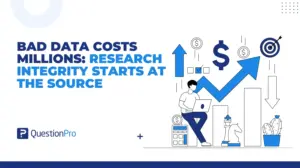
What is evaluation research?
Evaluation research, also known as program evaluation, refers to research purpose instead of a specific method. Evaluation research is the systematic assessment of the worth or merit of time, money, effort and resources spent in order to achieve a goal.
Evaluation research is closely related to but slightly different from more conventional social research. It uses many of the same methods used in traditional social research, but because it takes place within an organizational context, it requires team skills, interpersonal skills, management skills, political smartness, and other research skills that social research does not need much. Evaluation research also requires one to keep in mind the interests of the stakeholders.
Evaluation research is a type of applied research, and so it is intended to have some real-world effect. Many methods like surveys and experiments can be used to do evaluation research. The process of evaluation research consisting of data analysis and reporting is a rigorous, systematic process that involves collecting data about organizations, processes, projects, services, and/or resources. Evaluation research enhances knowledge and decision-making, and leads to practical applications.
LEARN ABOUT: Action Research
Why do evaluation research?
The common goal of most evaluations is to extract meaningful information from the audience and provide valuable insights to evaluators such as sponsors, donors, client-groups, administrators, staff, and other relevant constituencies. Most often, feedback is perceived value as useful if it helps in decision-making. However, evaluation research does not always create an impact that can be applied anywhere else, sometimes they fail to influence short-term decisions. It is also equally true that initially, it might seem to not have any influence, but can have a delayed impact when the situation is more favorable. In spite of this, there is a general agreement that the major goal of evaluation research should be to improve decision-making through the systematic utilization of measurable feedback.
Below are some of the benefits of evaluation research
- Gain insights about a project or program and its operations
Evaluation Research lets you understand what works and what doesn’t, where we were, where we are and where we are headed towards. You can find out the areas of improvement and identify strengths. So, it will help you to figure out what do you need to focus more on and if there are any threats to your business. You can also find out if there are currently hidden sectors in the market that are yet untapped.
- Improve practice
It is essential to gauge your past performance and understand what went wrong in order to deliver better services to your customers. Unless it is a two-way communication, there is no way to improve on what you have to offer. Evaluation research gives an opportunity to your employees and customers to express how they feel and if there’s anything they would like to change. It also lets you modify or adopt a practice such that it increases the chances of success.
- Assess the effects
After evaluating the efforts, you can see how well you are meeting objectives and targets. Evaluations let you measure if the intended benefits are really reaching the targeted audience and if yes, then how effectively.
- Build capacity
Evaluations help you to analyze the demand pattern and predict if you will need more funds, upgrade skills and improve the efficiency of operations. It lets you find the gaps in the production to delivery chain and possible ways to fill them.
Methods of evaluation research
All market research methods involve collecting and analyzing the data, making decisions about the validity of the information and deriving relevant inferences from it. Evaluation research comprises of planning, conducting and analyzing the results which include the use of data collection techniques and applying statistical methods.
Some of the evaluation methods which are quite popular are input measurement, output or performance measurement, impact or outcomes assessment, quality assessment, process evaluation, benchmarking, standards, cost analysis, organizational effectiveness, program evaluation methods, and LIS-centered methods. There are also a few types of evaluations that do not always result in a meaningful assessment such as descriptive studies, formative evaluations, and implementation analysis. Evaluation research is more about information-processing and feedback functions of evaluation.
These methods can be broadly classified as quantitative and qualitative methods.
Quantitative methods
The outcome of the quantitative research methods is an answer to the questions below and is used to measure anything tangible.
- How many?
- Who was involved?
- What were the outcomes?
- What was the price?
The best way to collect quantitative data is through surveys, questionnaires, and polls. You can also create pre-tests and post-tests, review existing documents and databases or gather clinical data.
Surveys are used to gather opinions, feedback or ideas of your employees or customers and consist of various question types. They can be conducted by a person face-to-face or by telephone, by mail, or online. Online surveys do not require the intervention of any human and are far more efficient and practical. You can see the survey results on dashboard of research tools and dig deeper using filter criteria based on various factors such as age, gender, location, etc. You can also keep survey logic such as branching, quotas, chain survey, looping, etc in the survey questions and reduce the time to both create and respond to the donor survey. You can also generate a number of reports that involve statistical formulae and present data that can be readily absorbed in the meetings. To learn more about how research tool works and whether it is suitable for you, sign up for a free account now.
Quantitative data measure the depth and breadth of an initiative, for instance, the number of people who participated in the non-profit event, the number of people who enrolled for a new course at the university. Quantitative data collected before and after a program can show its results and impact.
The accuracy of quantitative data to be used for evaluation research depends on how well the sample represents the population, the ease of analysis, and their consistency. Quantitative methods can fail if the questions are not framed correctly and not distributed to the right audience. Also, quantitative data do not provide an understanding of the context and may not be apt for complex issues.
Learn more: Quantitative Market Research: The Complete Guide
Qualitative methods
Qualitative research methods are used where quantitative methods cannot solve the research problem, i.e. they are used to measure intangible values. They answer questions such as
- What is the value added?
- How satisfied are you with our service?
- How likely are you to recommend us to your friends?
- What will improve your experience?
LEARN ABOUT: Qualitative Interview
Qualitative data is collected through observation, interviews, case studies, and focus groups. The steps for creating a qualitative study involve examining, comparing and contrasting, and understanding patterns. Analysts conclude after identification of themes, clustering similar data, and finally reducing to points that make sense.
Observations may help explain behaviors as well as the social context that is generally not discovered by quantitative methods. Observations of behavior and body language can be done by watching a participant, recording audio or video. Structured interviews can be conducted with people alone or in a group under controlled conditions, or they may be asked open-ended qualitative research questions. Qualitative research methods are also used to understand a person’s perceptions and motivations.
LEARN ABOUT: Social Communication Questionnaire
The strength of this method is that group discussion can provide ideas and stimulate memories with topics cascading as discussion occurs. The accuracy of qualitative data depends on how well contextual data explains complex issues and complements quantitative data. It helps get the answer of “why” and “how”, after getting an answer to “what”. The limitations of qualitative data for evaluation research are that they are subjective, time-consuming, costly and difficult to analyze and interpret.
Learn more: Qualitative Market Research: The Complete Guide
Survey software can be used for both the evaluation research methods. You can use above sample questions for evaluation research and send a survey in minutes using research software. Using a tool for research simplifies the process right from creating a survey, importing contacts, distributing the survey and generating reports that aid in research.
Examples of evaluation research
Evaluation research questions lay the foundation of a successful evaluation. They define the topics that will be evaluated. Keeping evaluation questions ready not only saves time and money, but also makes it easier to decide what data to collect, how to analyze it, and how to report it.
Evaluation research questions must be developed and agreed on in the planning stage, however, ready-made research templates can also be used.
Process evaluation research question examples:
- How often do you use our product in a day?
- Were approvals taken from all stakeholders?
- Can you report the issue from the system?
- Can you submit the feedback from the system?
- Was each task done as per the standard operating procedure?
- What were the barriers to the implementation of each task?
- Were any improvement areas discovered?
Outcome evaluation research question examples:
- How satisfied are you with our product?
- Did the program produce intended outcomes?
- What were the unintended outcomes?
- Has the program increased the knowledge of participants?
- Were the participants of the program employable before the course started?
- Do participants of the program have the skills to find a job after the course ended?
- Is the knowledge of participants better compared to those who did not participate in the program?







